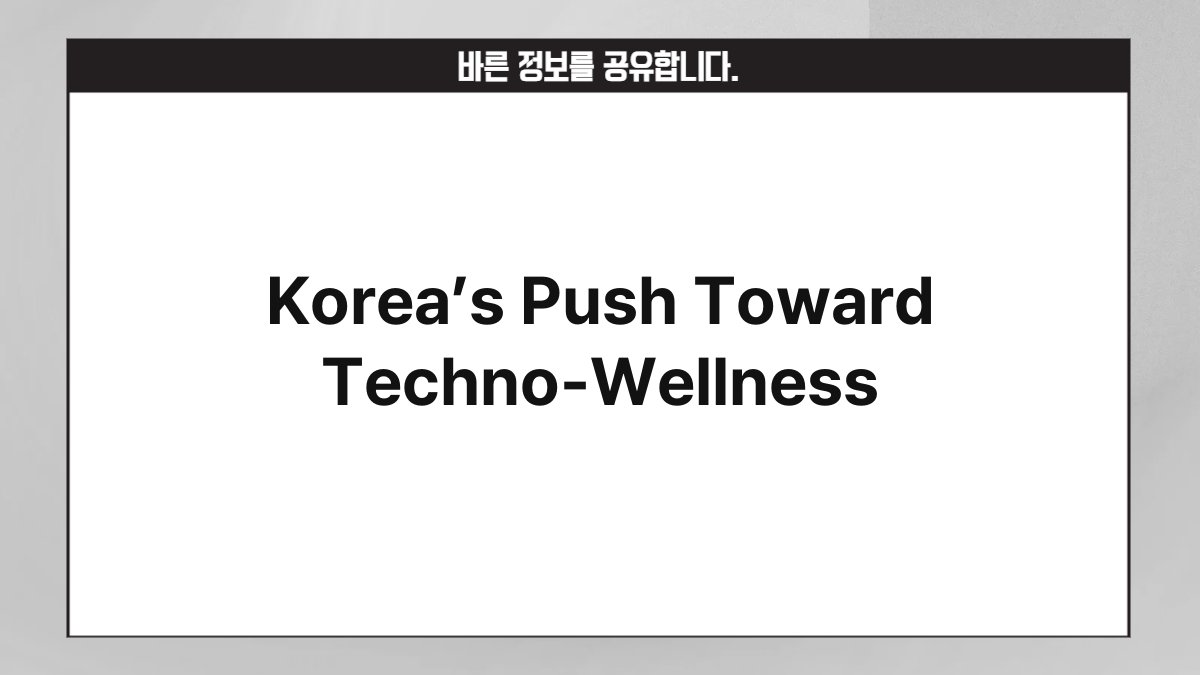[케이브릿지 미디어/Jay Son] Korea’s Push Toward Techno-Wellness represents a significant shift in how technology is integrated into health and well-being strategies.
This movement emphasizes the use of digital tools, data analytics, and innovative technologies to enhance the quality of life for individuals.
As South Korea embraces this trend, it seeks to address pressing health issues through a combination of high-tech solutions and wellness practices.
The country aims to create a holistic approach that merges technology with traditional wellness concepts, fostering a healthier society.
By reading this article, you will gain insights into the various aspects of Korea’s techno-wellness initiative, including its key components, benefits, challenges, and future prospects.
The Concept of Techno-Wellness in Korea
Defining Techno-Wellness
Techno-wellness refers to the integration of technology into wellness practices, aiming to enhance physical and mental health.
In Korea, this concept has gained traction as the country faces increasing health challenges, such as mental health issues and lifestyle-related diseases.
The focus is on using digital tools to promote healthier living, from fitness apps to mental health platforms.
This comprehensive approach recognizes that well-being encompasses more than just physical health; it includes emotional and social dimensions as well.
The intersection of technology and wellness in Korea is not merely a trend but a response to societal needs.
With a rapidly aging population and rising health care costs, the government and private sector are investing in innovative solutions.
Techno-wellness initiatives are designed to empower individuals to take charge of their health through accessible tools and resources.
By fostering a culture of wellness supported by technology, Korea aims to improve overall public health outcomes.
The Role of Government and Policy
The South Korean government plays a pivotal role in promoting techno-wellness through various policies and initiatives.
Recognizing the importance of health technology, the government has established frameworks to support research and development in this field.
Policies encourage collaboration between tech companies and health care providers to create innovative solutions tailored to the needs of the population.
Moreover, public health campaigns are increasingly incorporating digital platforms to reach wider audiences.
These campaigns aim to educate citizens about healthy lifestyles while promoting the use of technology for personal health management.
By leveraging the power of data analytics, the government can identify health trends and tailor interventions accordingly.
This proactive approach not only addresses current health issues but also prepares the nation for future challenges.
Cultural Attitudes Toward Tech and Wellness
Cultural perceptions of technology and wellness in Korea significantly influence the adoption of techno-wellness practices.
Traditionally, wellness has been associated with holistic approaches, such as herbal medicine and mindfulness.
However, the younger generation is more open to integrating technology into their wellness routines.
This shift reflects a broader acceptance of digital solutions as valuable tools for enhancing quality of life.
As technology becomes increasingly embedded in daily life, there is a growing recognition of its potential benefits for health.
Mobile applications that track fitness, nutrition, and mental well-being are gaining popularity, particularly among millennials and Gen Z.
This generational shift is crucial for the success of Korea’s techno-wellness movement, as it suggests a willingness to embrace innovative solutions for health improvement.
Innovations Driving Techno-Wellness
Wearable Technology
Wearable technology is at the forefront of Korea’s techno-wellness movement.
Devices such as smartwatches and fitness trackers have become commonplace, allowing users to monitor their health metrics in real time.
These devices provide valuable insights into physical activity, heart rate, and sleep patterns, empowering individuals to make informed health decisions.
The data collected by wearables can also contribute to broader health initiatives.
For instance, aggregated data can help health professionals identify trends and develop targeted interventions for specific populations.
This synergy between individual tracking and public health initiatives exemplifies the potential of wearable technology in fostering a healthier society.
Mobile Health Applications
Mobile health applications are transforming the landscape of personal wellness in Korea.
These apps offer a range of services, from workout plans to mental health support.
Users can access resources tailored to their specific needs, promoting a personalized approach to wellness.
Moreover, these applications often incorporate social features, allowing users to connect with others on similar wellness journeys.
This sense of community can enhance motivation and accountability, leading to better health outcomes.
As mobile health applications continue to evolve, they will play a crucial role in supporting Korea’s techno-wellness vision.
Telehealth Services
Telehealth services have gained prominence in Korea, particularly in response to the COVID-19 pandemic.
These services allow patients to consult with healthcare professionals remotely, increasing access to care and reducing barriers associated with traditional in-person visits.
Telehealth platforms are especially beneficial for individuals in rural areas or those with mobility challenges.
The integration of telehealth into Korea’s healthcare system aligns with the broader techno-wellness initiative.
By utilizing technology to enhance access to medical services, the country is addressing health disparities and promoting preventive care.
As telehealth continues to expand, it will be essential for ensuring that all citizens can benefit from the advancements in healthcare technology.
Benefits of Techno-Wellness
Improved Accessibility to Health Resources
One of the primary benefits of Korea’s push toward techno-wellness is the improved accessibility to health resources.
Digital platforms enable individuals to access information and services that may have previously been out of reach.
For instance, patients can now consult specialists without the need for extensive travel, making healthcare more equitable.
This accessibility is particularly crucial for vulnerable populations, including the elderly and those with chronic conditions.
By leveraging technology, Korea is working to ensure that all citizens can benefit from the advancements in health care, regardless of their geographic location.
This democratization of health resources is a significant step toward achieving better public health outcomes.
Enhanced Personalization of Health Care
Techno-wellness also promotes the personalization of health care, allowing individuals to tailor their wellness journeys according to their unique needs.
The use of data analytics enables healthcare providers to offer customized recommendations based on individual health profiles.
This personalized approach can lead to more effective interventions and improved health outcomes.
Moreover, as individuals engage with technology to monitor their health, they gain insights that empower them to make informed decisions.
This shift from a one-size-fits-all model to a more individualized approach represents a transformative change in how health care is delivered in Korea.
Increased Engagement in Health Management
The integration of technology into wellness practices fosters greater engagement among individuals in managing their health.
With tools that track progress and provide feedback, users are more likely to stay committed to their wellness goals.
This increased engagement can lead to healthier lifestyle choices and a greater sense of ownership over one’s health.
Furthermore, the social aspects of many health technologies encourage users to connect with others, fostering a sense of community and support.
This social engagement can enhance motivation and accountability, further promoting positive health behaviors.
As a result, Korea’s techno-wellness initiatives are not only improving individual health outcomes but also strengthening community ties.
Challenges Facing Techno-Wellness
Data Privacy Concerns
As Korea embraces techno-wellness, data privacy concerns emerge as a significant challenge.
The collection and analysis of personal health data raise questions about how this information is stored, used, and shared.
Individuals may be hesitant to adopt health technologies if they feel their privacy is at risk.
To address these concerns, it is essential for stakeholders to establish robust data protection policies.
Transparency in how data is handled and the implementation of security measures are critical for building trust among users.
By prioritizing data privacy, Korea can create a safer environment for individuals to engage with techno-wellness solutions.
Digital Divide
The digital divide poses another challenge to the successful implementation of techno-wellness in Korea.
While younger generations are quick to adopt technology, older adults and those in lower socioeconomic groups may struggle to access digital health resources.
This disparity can lead to unequal health outcomes and exacerbate existing health inequalities.
To mitigate this issue, initiatives must focus on bridging the digital divide.
Providing education and resources to underserved populations can empower them to take advantage of techno-wellness solutions.
By ensuring that all citizens have equal access to technology, Korea can promote a more inclusive approach to health and wellness.
Resistance to Change
Resistance to change can hinder the widespread adoption of techno-wellness practices.
Some individuals may be skeptical of technology’s role in health care, preferring traditional methods of treatment and wellness.
This resistance can be particularly pronounced among older adults who may be less familiar with digital tools.
To overcome this challenge, it is crucial to promote the benefits of techno-wellness through education and outreach.
Demonstrating how technology can enhance health and well-being can help shift perceptions and encourage adoption.
By fostering a culture of openness to innovation, Korea can facilitate a smoother transition toward a techno-wellness future.
Future Prospects of Techno-Wellness in Korea
Integration with Traditional Wellness Practices
The future of Korea’s techno-wellness movement lies in its ability to integrate technology with traditional wellness practices.
By blending modern innovations with time-honored approaches, the country can create a comprehensive framework for health and well-being.
This integration can enhance the effectiveness of wellness initiatives while preserving cultural heritage.
As the public becomes more receptive to the benefits of techno-wellness, there is an opportunity for collaboration between tech developers and traditional health practitioners.
This synergy can lead to the development of solutions that honor cultural practices while embracing technological advancements.
The result will be a holistic approach to wellness that resonates with diverse populations.
Expansion of Telehealth Services
The expansion of telehealth services presents a promising avenue for the future of techno-wellness in Korea.
As technology continues to evolve, telehealth platforms will become increasingly sophisticated, offering a wider range of services.
This growth will enable healthcare providers to reach more individuals and deliver care more efficiently.
Furthermore, the integration of artificial intelligence and machine learning into telehealth can enhance diagnostic accuracy and treatment recommendations.
As these technologies advance, they will play a critical role in shaping the future of health care in Korea.
The continued investment in telehealth will ensure that citizens have access to quality care, regardless of their location.
Global Collaboration and Knowledge Sharing
Korea’s push toward techno-wellness also opens the door for global collaboration and knowledge sharing.
As the country pioneers innovative health solutions, there is an opportunity to share insights and best practices with other nations facing similar health challenges.
Collaborative efforts can lead to the development of global standards and frameworks for techno-wellness.
By participating in international discussions and partnerships, Korea can position itself as a leader in the field of health technology.
This leadership can foster innovation and drive advancements that benefit not only the nation but also the global community.
Through collaboration, Korea can contribute to a healthier world, leveraging technology to improve well-being for all.
Conclusion
Korea’s push toward techno-wellness represents a transformative shift in how health and wellness are approached in the digital age.
By integrating technology into wellness practices, the country is addressing pressing health challenges while promoting a culture of well-being.
The benefits of this initiative are profound, from improved accessibility to personalized care and increased engagement in health management.
However, challenges such as data privacy concerns, the digital divide, and resistance to change must be addressed to ensure the success of techno-wellness initiatives.
Looking ahead, the integration of traditional wellness practices, the expansion of telehealth services, and global collaboration will play pivotal roles in shaping the future of health in Korea.
As the country continues to innovate and adapt, it sets a precedent for others to follow in the pursuit of a healthier, more connected world.








